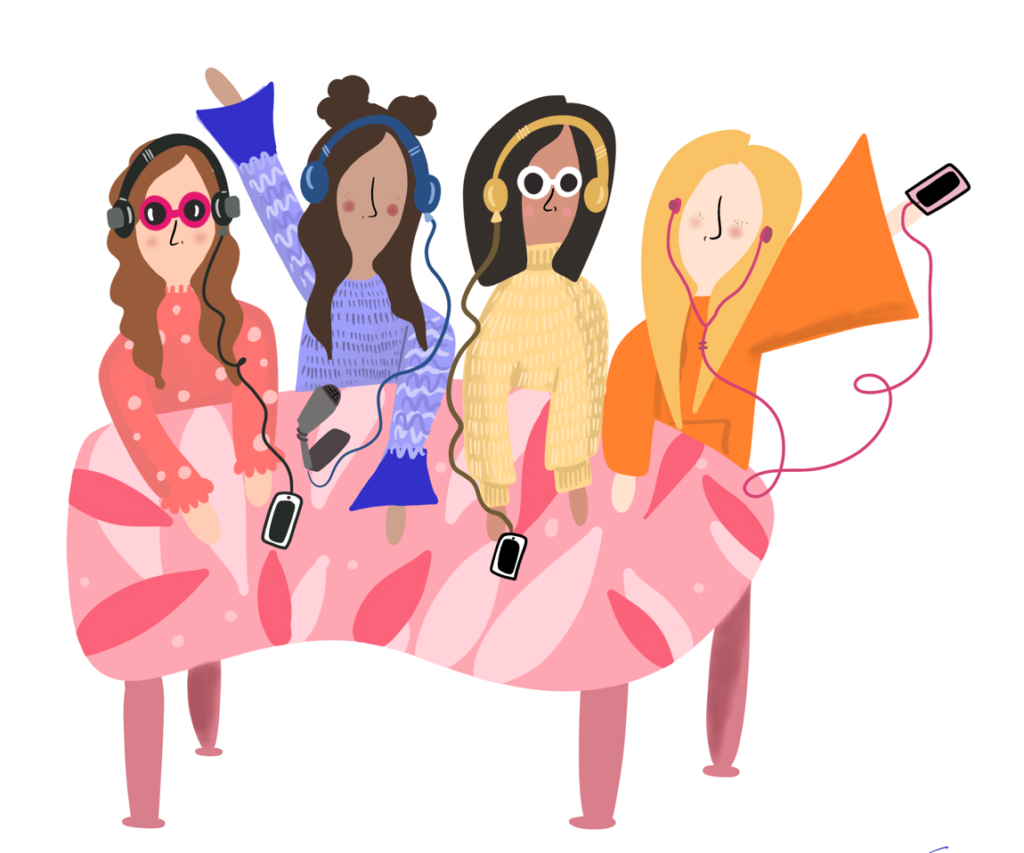Flooding the airwaves with stories from inspirational women, the local students behind a female-focused podcast share their top lessons learned.
By Kasee Bailey, Illustration by Madison Weakley

During her years teaching middle school, educator Jennifer Dean noticed a prevalent—and troubling—pattern among the young women she taught: They didn’t know the power of their own voices.
After rubbing shoulders with amazing women for her own podcast, and on the coattails of the powerful energy of the Women’s March, in 2017, Dean decided to involve her female students in the storytelling process. What started as a handful of girls meeting in a classroom after school at Leander Middle School resulted in sisterhood-forming, confidence-building, skill-expanding experiences.
“There is that culture of competition, especially when you get into middle school,” Dean says. “I became an adult and realized how powerful it was to have other women on your team. You’re all rooting for each other rather than competing for something. As there are more opportunities, that also leads to us having a more supportive and connective environment for women and girls.”
Five chapters, two states, a New York Times mention and more than 50 girls later, Dean’s brainchild, All Girls Considered, episodes of which are available on iTunes and SoundCloud, continues working to empower girls in safe, inclusive spaces to share their unique voices by connecting them to powerful women, whose stories they share on their national-audience-reaching podcast.
The young voices behind All Girls Considered manage all aspects of podcast creation, and regularly find themselves dialoguing with females’ finest, from the likes of Design Sponge Founder Grace Bonney, designer Joy Cho, first female Boston Marathoner Kathrine Switzer and a host of other inspirational women. Here, the girls—and some of their biggest cheerleaders— share five universal lessons they’ve learned from their experiences with All Girls Considered.
EMBRACE YOUR VOICE.
“Don’t be afraid to speak out your mind,” says Ariana, an eighth-grader at Leander Middle School. “Even though you’re an eighth-grader, you can still make a change. It just starts with one person.”
Jo, an eighth-grader at Wiley Middle School, adds, “We are not here to say that women are better than men. We’re just here to get voices out that haven’t been recognized as we believe they should. We’re just trying to create a little bit of balance.”
VALUE YOUR EXPERIENCES.
“Every girl and woman has a unique experience and something unique that they can bring to this table that we can all learn from and help each other become better people,” says Eleanor, a seventh-grader at Wiley Middle School.
LISTEN TO THE RISING GENERATION.
“What I’ve learned from young women is they want to be a part of the story,” says AGC Founder Dean. “They want to learn. They want their voices to be heard. They want to feel like they can create change. And I think that to say that it’s too much for them is not giving them enough credit.”
Alex Laird, an AGC sponsor at Wiley Middle School, agrees, noting, “My absolute favorite part of sponsoring this club is just watching these friendships that have grown between the girls and how they never really put each other down. They’re always there to build each other up. They just are not the catty girls that a lot of people stereotype middle schoolers as. They’re really focused on working together and making each other stronger.”
OPEN YOURSELF TO INSPIRATION.
“It’s amazing to realize that no matter how extraordinary these women are, in the end, we’re all just human and we can all relate,” says Lyndee, an 11th-grader at Leander High School.
ACKNOWLEDGE ISSUES.
“I’ve learned that if you see a problem, even if it’s just at school or worldwide,” says Brianna, a sixth-grader at Wiley Middle School, “you should talk about it and you shouldn’t be afraid to talk about it because someone else can probably relate to it.”

